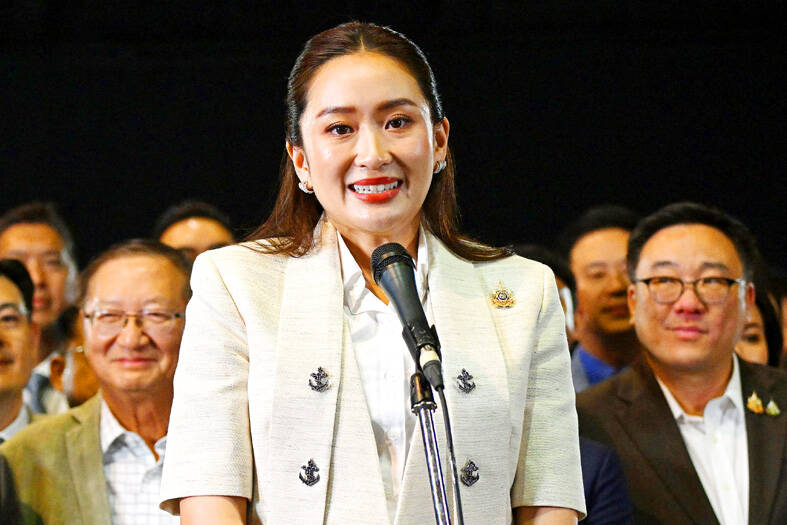The youngest daughter of former Thai prime minister Thaksin Shinawatra won a parliamentary vote to become the Southeast Asian nation’s next leader, capping a tumultuous period that saw a court oust her predecessor and dissolve the top opposition party.
Paetongtarn Shinawatra, 37, secured the support of 319 lawmakers in the 500-member Thai House of Representatives, making her Thailand’s youngest prime minister ever. Her elevation keeps intact an unwieldy alliance between the Shinawatra-controlled Pheu Thai Party and a number of royalist conservative and military-backed parties that joined together following an election last year.
Paetongtarn appeared nervous when addressing reporters for the first time after the parliamentary vote. She declined to answer any questions about her government’s policies, saying she would wait until her appointment is endorsed by Thai King Maha Vajiralongkorn.

Photo: AFP
“I never thought I’m the smartest person in the room, but I have clear motivations and I have a strong team with me,” Paetongtarn said with a shaky voice. “My father Facetimed me and told me to do my best. He said he was happy to see his daughter in this post before he gets Alzheimer’s.”
Paetongtarn becomes the third member of the influential Shinawatra clan to lead the country. Her father was removed in a 2006 coup, while her aunt, Yingluck Shinawatra, was disqualified by a court shortly before a 2014 takeover by the military.
She was picked for the top job after the Thai Constitutional Court dismissed former prime minister Srettha Thavisin as leader in an ethics violation case. His 11-month-old tenure saw his party’s popularity slide as the now-disbanded Move Forward — winner of the most seats in last year’s election and now the principal opponent of the pro-royalist establishment — steadily climbed.
While Paetongtarn might continue much of the policies pursued by Srettha’s administration, she might abandon a plan to distribute 10,000 baht (US$286) each to an estimated 50 million adults to stimulate the economy, local media reported yesterday.
Besides keeping the coalition together, Paetongtarn would need to find ways to lift sluggish economic growth, attract foreign investment into high-tech industries and stem the exodus of foreign funds from the nation’s stocks.
The support of conservative groups for a Pheu Thai-led government is a sign that a deal between the pro-royalist establishment which allowed Thaksin to return from a 15-year exile was still intact.
Although her victory ended a brief period of political uncertainty, it is far from certain that her government would be stable.
“She will be her father’s puppet and won’t likely be able to do much,” said Punchada Sirivunnabood, an associate professor at Mahidol University in Thailand. “Questions remain how she’ll be able to solve economic issues which even Srettha couldn’t.”

The CIA has a message for Chinese government officials worried about their place in Chinese President Xi Jinping’s (習近平) government: Come work with us. The agency released two Mandarin-language videos on social media on Thursday inviting disgruntled officials to contact the CIA. The recruitment videos posted on YouTube and X racked up more than 5 million views combined in their first day. The outreach comes as CIA Director John Ratcliffe has vowed to boost the agency’s use of intelligence from human sources and its focus on China, which has recently targeted US officials with its own espionage operations. The videos are “aimed at

STEADFAST FRIEND: The bills encourage increased Taiwan-US engagement and address China’s distortion of UN Resolution 2758 to isolate Taiwan internationally The Presidential Office yesterday thanked the US House of Representatives for unanimously passing two Taiwan-related bills highlighting its solid support for Taiwan’s democracy and global participation, and for deepening bilateral relations. One of the bills, the Taiwan Assurance Implementation Act, requires the US Department of State to periodically review its guidelines for engagement with Taiwan, and report to the US Congress on the guidelines and plans to lift self-imposed limitations on US-Taiwan engagement. The other bill is the Taiwan International Solidarity Act, which clarifies that UN Resolution 2758 does not address the issue of the representation of Taiwan or its people in

US Indo-Pacific Commander Admiral Samuel Paparo on Friday expressed concern over the rate at which China is diversifying its military exercises, the Financial Times (FT) reported on Saturday. “The rates of change on the depth and breadth of their exercises is the one non-linear effect that I’ve seen in the last year that wakes me up at night or keeps me up at night,” Paparo was quoted by FT as saying while attending the annual Sedona Forum at the McCain Institute in Arizona. Paparo also expressed concern over the speed with which China was expanding its military. While the US

SHIFT: Taiwan’s better-than-expected first-quarter GDP and signs of weakness in the US have driven global capital back to emerging markets, the central bank head said The central bank yesterday blamed market speculation for the steep rise in the local currency, and urged exporters and financial institutions to stay calm and stop panic sell-offs to avoid hurting their own profitability. The nation’s top monetary policymaker said that it would step in, if necessary, to maintain order and stability in the foreign exchange market. The remarks came as the NT dollar yesterday closed up NT$0.919 to NT$30.145 against the US dollar in Taipei trading, after rising as high as NT$29.59 in intraday trading. The local currency has surged 5.85 percent against the greenback over the past two sessions, central